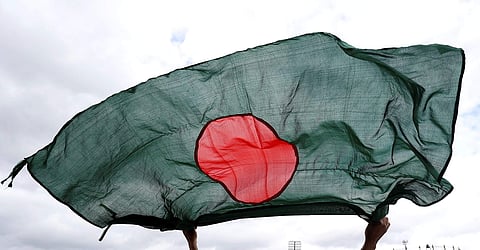

NEW DELHI: Amidst the ongoing turmoil and instability across the country, Bangladesh is facing another challenge – the rapidly increasing influence of the Hizb ut Tahrir (HuT). The HuT is a fundamentalist political organisation that aspires to re-establish the Islamic Caliphate and implement Sharia globally.
Although the HuT was banned in Bangladesh in October 2009, its supporters are taking out marches, including in Dhaka, and posters propagating their ideology have mushroomed.
"The Hizb ut Tahrir is an organisation that is well established and consists of educated people. Their influx is across all segments of society in Bangladesh at present," Professor Nazmul Ahsan Kalimullah, a political commentator from Dhaka, told The New Indian Express.
On August 9, supporters of the HuT organised a rally at Baitul Mukarram North Gate in Dhaka and demanded the establishment of the Khalifah in Bangladesh based on Sharia law which they claim would ensure “true justice and welfare” of all the citizens in Bangladesh.
They also called to oust foreign companies and annul strategic agreements with non-Muslim states.
"This is a worrying trend as they seem to have sympathisers in the army. They don’t believe in democracy and are against gender rights, so women have a lot to worry about," a source from Dhaka told The New Indian Express.
Meanwhile, some arrests have been made in India too of covert HuT operatives who seem to be expanding their network. Most of them are educated and spread their propaganda through students.
Arrests have been made in Madhya Pradesh, Chattisgarh, Telangana and Tamil Nadu.
"If the HuT movement intensifies in Bangladesh, it would have an impact in India too as covert operators in India are likely to coordinate with Bangladesh," said a source.
The HuT has been banned in China, Russia, Pakistan, Germany, Turkey, UK, Central Asia, Indonesia and all Arab countries except Lebanon, Yemen and UAE.
In January, the British Parliament had cleared a draft laid by the then Home Secretary James Cleverly to proscribe the HuT under the Terrorism Act 2000.